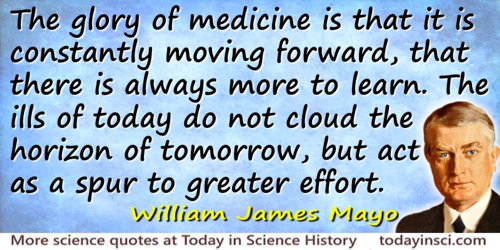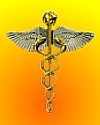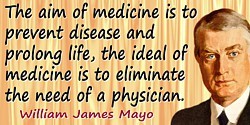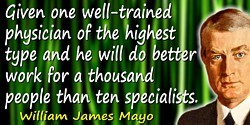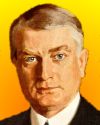 (source)
(source)
|
William James Mayo
(29 Jun 1861 - 28 Jul 1939)
American surgeon , who, with his brother Charles, ran the Mayo Clinic founded by their father, William Worrall Mayo.
|
William James Mayo
“The glory of medicine”
Illustrated Quote - Medium (500 x 250 px)
More William James Mayo quotes on science >>
William J. Mayo gave an address to the National Education Association at their Annual Meeting in Minneapolis during the first week of July 1928, the year he retired from surgery. He spoke to the educators about the “Aims and Ideals of the American Medical Association.” The education of medical students was included in his topics, as well as the practice of medicine for the benefit of the patient. As he came towards the end of his talk, he said:
“The glory of medicine is that it is constantly moving forward, that there is always more to learn. The ills of today do not cloud the horizon of tomorrow, but act as a spur to greater effort. The triumph of the medical profession lies in the victory over physical ailments of man. The failure lies in an inability to appreciate and deal intelligently with the with the emotional instabilities of those physically ill or those with inherited or acquired instabilities of the nervous system which lead to miseries as grievous as though they were dependent on tangible physical causes.”
After a few more remarks, he closed by defining the “Aim of Medicine,” echoing the title of talk:
“The aim of medicine is to prevent disease and prolong life, the ideal of medicine is to eliminate the need of a physician.”
- Science Quotes by William James Mayo.
- 29 Jun - short biography, births, deaths and events on date of Mayo's birth.
- William Mayo - context of quote “The aim of medicine” - Medium image (500 x 250 px)
- William Mayo - context of quote “The aim of medicine” - Large image (800 x 400 px)
- William James Mayo - context of quote “One well-trained physician” - Medium image (500 x 250 px)
- William James Mayo - context of quote “One well-trained physician” - Large image (800 x 400 px)
- William James Mayo - context of quote “The glory of medicine” - Large image (800 x 400 px)
